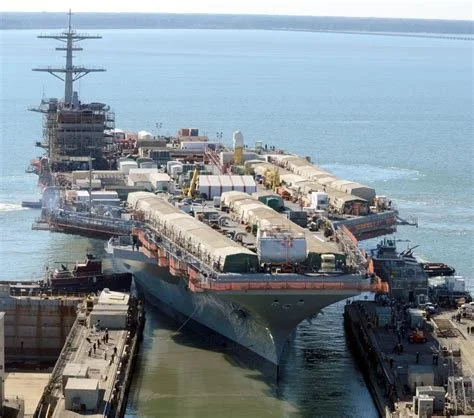CVN 72 Emerging from Drydock at Newport News
Introduction
I’m switching topics from High Reliability Organizing (HRO) to focus on U.S. Navy ship overhaul (“overhaul” from now on). I will touch on HRO periodically because overhaul done well is a form of applied HRO. When not done well, it’s a costly, flaming garbage barge of technical and personnel problems that produces lots of suffering for all participants, not just the crew.
I find writing about overhaul interesting for several reasons. First, the same problems occur over and over at the micro-level (crew unprepared and overwhelmed, shipyard leaders frustrated with crew performance, etc.) and strategic level (poor planning, new work, finishing late, cost overruns, etc.). Second, overhauls seem to be heavily influenced by “the human inclination to hope that things will work out, despite evidence or suspicions to the contrary” (Rickover, 1979). Finally, I see many applications for the research literature that formed the core of my doctorate in Human and Organizational Learning.
The focus of this series is my observations from overhaul and what I infer about its underlying realities. I believe that ignoring these realities has a connection to repeatedly committing the same errors. “Causes the errors” is too strong. In future posts, I hope to suggest actions that individuals can take to make their overhaul experience a little less horrible, particularly ships’ junior officers who do a lot of the suffering (McCarthy, 2022). This introductory post to my series on overhaul is organized as follows:
what overhaul is,
my overhaul experience (why anyone should believe me)
the path ahead for the series (very brief)
What Overhaul Is
Overhaul is a dedicated period of maintenance and modernization performed on a ship in a repair facility called a shipyard. Maintenance scheduled for less than six months is typically referred to as an availability because the ship is made “available” for maintenance and not performing its mission. Maintenance scheduled for more than six months is usually referred to as an overhaul, but the names and definitions lack sharp boundaries (COMUSFLTFORCOMINST 4790.3, 3.2). In this blog, overhaul refers to a maintenance period scheduled for greater than or equal to six months, a budget of more than $100M, and a planned shipyard (SY) workload greater than 100,000 man-days (MDS). For shorter maintenance periods, the crew and maintenance personnel can bludgeon their way through and recover later. That’s not possible in overhauls because people can’t last that long.
Overhauls impact the crew and changes the physical state of the ship and its equipment in many ways. For most of the overhauls, the ship remains in commission and the crew lives and works onboard or is temporarily relocated to barges moored in the shipyard. For overhauls that render the ship uninhabitable, the crew is housed in temporary quarters outside the shipyard. The material work performed during overhauls includes installing new equipment, repairing normal wear or damage to existing equipment, refurbishing spaces, and conducting inspections followed by repairs. Some inspections to determine repairs can’t be done before overhaul because they are so intrusive they would interfere with the ship’s mission. That’s typically a “no go” in Navy maintenance although there are ways around it like “early start.”
One of the distinguishing characteristics of U.S. Navy ship overhaul is the engagement of the ship’s operators, the crew. Unlike maintenance on all other military hardware, the crew of the ship is intimately involved with all aspects of overhaul work. No tank or aircraft crew remains inside while the vehicle is repaired. This makes the maintenance activity (shipyard) and crew overhaul relationship different from all maintenance performed on other military hardware.
In overhaul, the ship CO retains his responsibility for all operations, including maintenance by outside activities. In accordance with Navy Regulations, the responsibility of the ship’s Commanding Officer (CO) is absolute (U.S. Navy Regulations, Ch. 8). The CO only relinquishes his authority for ship navigation in overhaul under very narrow conditions. While it is possible to transfer the CO’s responsibility to another entity and move the entire crew off the ship before an overhaul (it has been done), Navy leaders usually don’t permit it for reasons I will discuss in the future.
My Experience
I have extensive overhaul experience, having served as an Unrestricted Line Officer (URL) and Engineering Duty Officer (EDO) for over 29 years of active military service. I served on ships in overhaul before and after I transitioned to Engineering Duty, which is rare. I actively participated in nine overhauls in multiple roles and conducted assessments of many others. Some of the overhauls finished on time and under budget, some late and over budget.
I have held billets in overhaul at every level of the crew below CO/XO. I was in their offices a lot, however. This means I know what it’s like as an operator to feel lost, overwhelmed or at risk of getting fired from errors in the overhaul environment. It also means that I have suffered through the consequences of faulty planning assumptions made by others, though I sometimes I made sure they shared in the suffering.
As an EDO, I was a member of three overhaul project management teams. I’ve followed shipyard foremen, combined trade supervisors, engineers, and senior shipyard leaders while they managed work. I led the planning of three overhauls with budgets between $300M and $2B, not including planning costs. I was responsible for multiple project management teams at the same time as Supervisor of Shipbuilding Project Officer, naval shipyard Operations Officer, and Commanding Officer of a Supervisor of Shipbuilding. I’ve audited overhaul planning and performance and been the subject of such audits, sometimes with my career on the line. Those are the fun ones.
My overhaul experience is unusual, which is why I am keen to write about it. I have seen and lived with the consequences of bad planning by others and myself. I have made hundred million dollar (or more) decisions without data because it wasn’t available and somebody had to make a decision. I have argued with people who claimed to have really good financial models of shipyard performance who couldn’t explain them to me. I know the frustration of being ignored when I tried to help ship’s force avoid overhaul minefields then watched them march right in. I have seen crews and project teams make the same mistakes over and over. I have been thrown out of offices for standing my ground on crucial issues. I’m not claiming that I was always right, however. I know the pain of being yelled at by people who knew what I needed to do AND who had no idea what I was required to do and weren’t interested in learning (Krueger & Dunning, 2002). Hint: don’t argue with these people. Finally, I know the cold comfort of being audited by outside organizations that have ignored what I had been reporting to them for months or years.
The Path Ahead
In future posts, I am going to focus on my experience, observations, and the inferences I make from them. I’m going to write about the harsh realities of overhaul that are frequently ignored. Along the way, I will identify many “undiscussables” of overhaul that make improving the outcomes so challenging (Argyris, 2003). Facing facts about overhaul is the reason why I’m starting this series. It’s going to be a bumpy ride for some readers, but I promise it will be interesting.
References
Argyris, C. (2003). A life full of learning. Organization Studies, 24(7), 1178-1192.
COMUSFLTFORCOMINST 4790.3, JOINT FLEET MAINTENANCE MANUAL, II. Retrieved from https://www.navsea.navy.mil/Portals/103/Documents/SUBMEPP/Volume%20II.pdf
Kruger, J., & Dunning, D. (1999). Unskilled and unaware of it: How difficulties in recognizing one’s own incompetence lead to inflated self-assessments. Journal of Personality and Social Psychology, 77(6), 1121-1134.
McCarthy, E. (2022). Take JOs out of the shipyards. USNI Proceedings, 148(10). Retrieved from https://www.usni.org/magazines/proceedings/2022/october/take-jos-out-shipyards
Rickover, H.G. (1979). Statement before the House Subcommittee on Energy Research and Production of the Committee of Science and Technology (May 24, 1979).
U.S. Navy Regulations, Chapter 8, https://www.secnav.navy.mil/doni/US%20Navy%20Regulations/Chapter%208%20-%20The%20Commanding%20Officer.pdf



